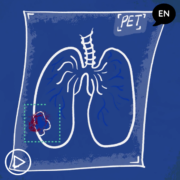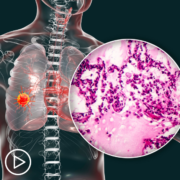Understanding Oncogene-Driven Lung Cancer: Targeted Therapy Advances and Challenges
Understanding Oncogene-Driven Lung Cancer: Targeted Therapy Advances and Challenges from Patient Empowerment Network on Vimeo.
How do the genetic mutations of EGFR and exon 20 impact lung cancer? Expert Dr. Christina Baik from Fred Hutchinson Cancer Center discusses oncogene-driven lung cancer and how it differs from other lung cancer types.
See More from START HERE Lung Cancer
Related Resources:

|

Newly Diagnosed Non-Small Cell Lung Cancer | Key Advice for Patients |

Advancing Lung Cancer Treatment: Bridging the Gap in Personalized Care |
Transcript:
Lisa Hatfield:
What exactly is oncogene-driven lung cancer, and how does it differ from the other types of lung cancer?
Dr. Christina Baik:
So in lung cancer, there are certain lung cancers where the growth of the cancer is dependent on a particular genetic abnormality. So there is one gene that makes that cancer grow. And because of that, there have been treatments that are developed against that particular genetic abnormality. So, it is referring to lung cancers that have that particular genetic abnormality. A prime example of this is lung cancers that have what we call an EGFR mutation.
That means that there is this gene called EGFR that is abnormal, and that’s making the cancer grow. Now, not everyone has a cancer gene that is driving that cancer. I would say about 30 percent or for 30 percent to 40 percent of patients would have an oncogene-driven cancer for which there may be treatments either as a standard treatment or in clinical trials. But the majority of patients do not have an oncogene, meaning that genetic abnormality where there is a targeted therapy option. So that’s the distinction we make. And I know this term or phrase is used a lot, but that’s what it means. And if you want to know if one has an oncogene-driven lung cancer, you would know based on the genetic test results.
Lisa Hatfield:
Okay. Great. Thank you. And just for clarification too, the genetic mutations are found in the cancer cells, not in their body, the cells? So that’s what the genetic testing is done just on the cancer cells. Is that correct?
Dr. Christina Baik:
Yes. Yes.
Lisa Hatfield:
Okay, great.
Dr. Christina Baik:
Thank you for clarifying that. That’s a very important distinction.
Lisa Hatfield:
Yeah. Thank you. So that leads right into the next question, and it’s kind of a lengthy question. And this person is asking, “Dr. Baik, you have done considerable research around EGFR exon 20 insertion mutations in non-small cell lung cancer, considering their association with poor survival outcomes, what are the survival implications of having EGFR exon 20 insertion mutations compared to other types of EGFR mutations?”
Dr. Christina Baik:
Now this gets a bit complicated, but not all EGFR lung cancers are the same. And there are patients who have what we call EGFR mutation that is a classical mutation. And I throw out that term, because that’s how it’s written on the Internet and a lot of papers. And then, so that’s one group, and the other group are patients who have this exon 20 insertion mutation. And the reason these are separated is because the treatments that work very well in the classical mutations do not work very well in this particular exon 20 mutation.
So when we look at all patients with EGFR mutation, it is true that the prognosis is poor in exon 20 patients just because there are no great targeted therapy options. That said, I am very hopeful that this is changing. There are a number of targeted therapies for exon 20 that are in trials, and I think these are going to be FDA-approved in the future, not too far off in the future, I believe. So I think the survival implications will start to hopefully equalize amongst all the EGFR-mutated lung cancer patients.
Share Your Feedback
Create your own user feedback survey










